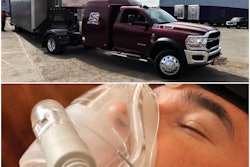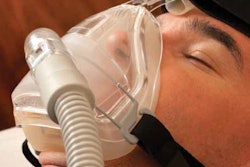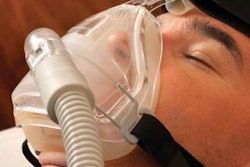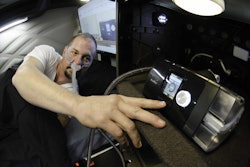A set of recommended sleep apnea screening protocols first recommended in 2016 appears to have been adopted by some medical examiners who perform Department of Transportation physicals. There’s evidence the screening criteria may have been plucked from a draft update to the Federal Motor Carrier Safety Administration’s official Medical Examiner handbook. The draft was posted online in April as part of the public record from an FMCSA Medical Review Board meeting that in part discussed potential updates to the handbook.
Publication of the draft does not violate the spirit of Congress’ 2013 requirement that FMCSA follow formal rulemaking procedures in any official guidance on apnea protocols, said FMCSA spokesman Duane DeBruyne. The draft, with its newly included sleep apnea screening guidelines, is a work in progress up for discussion, he said, and “does not provide current, official, FMCSA interpretation and guidance to medical screeners.”
Following Overdrive‘s inquiry, DeBruyne and FMCSA staff also discovered a “technical glitch” that might have contributed to confusion about the document’s status. Every page is clearly marked as a “draft” with a large watermark, at least for many viewers. But in some cases, depending on the software the reader is using to access the draft, the watermark sometimes is not visible.

“On my own home computer,” he added, “I likewise do not see the word/watermark ‘DRAFT’ anywhere in that document.” The agency is “feverishly working on solving” the problem, DeBruyne said.
Apnea screening protocols put forward as Medical Review Board recommendations in the draft closely resemble those drafted in 2016 when FMCSA was considering a rulemaking (later abandoned) around the condition. Among other things, it would require any driver with a body mass index measurement greater than or equal to 40 to receive a conditional certification pending results of diagnostic testing for sleep apnea. Other criteria specify a variety of screens for drivers with a body mass index greater than or equal to 33. The wide net the screens would cast, Overdrive research estimated at the time, might have screened between 25% and 38% of truckers then not being treated for apnea.
The recent draft was crafted as part of what the Medical Review Board had been tasked to complete by the end of 2017. There’s some evidence the technical glitch or simply the draft’s publication itself may have facilitated confusion for some medical screeners and third-party companies in the business of printing and distributing guidebooks and software.
Earlier this month, Ohio-based 18-year professional trucker Aaron McCloskey went in to do his medical certification renewal. The examiner recommend a three-month conditional certification on account of screening software that, nearing the end of his examination, popped up with a recommendation for sleep apnea screening.
McCloskey, a company driver for a Pittsburgh, Pennsylvania-based trucking company specializing in events, furloughed at least through the end of July, notes he’s been overweight through his entire career, with some slight ups and downs. “I have been defined as ‘morbidly obese’ for all of those 18 years,” he said. Nonetheless, “I have a safe driving record, with only one accident. That accident was caused by the auto driver and I was not cited.”
He’d been screened for sleep apnea testing about six or seven years ago, and had been cleared to drive minus treatment. Given he’s treated for high blood pressure, he renews his certification every year. He felt any question of sleep apnea had long ago been resolved.
In the recent attempt at med cert renewal, “I had given [the examiner] no indication of symptoms related to sleep apnea,” he said. “She then told me that due to my [body mass index (BMI) measurement], and my BMI alone, I am required to have a sleep apnea test, and that she would only be giving me a three-month card.”
The examiner and McCloskey discussed the lack of regs that specify any hard-fast BMI screening cutoff. “I expressed that I felt she was discriminating against me based on my weight, which of course she denied. Initially, I agreed to accept the three-month card. Then I decided I would not accept the three-month card, requested my paperwork, and left.”
The plot thickened the following day at a clinic of the large network of occupational health provider Concentra. An examiner referenced a “new law,” said McCloskey, requiring screening if your BMI measurement is above 40. Pretty much his “exact words. Mind you, the most interaction I had with this doctor was a hello” before he said this. “I reacted passionately, telling him he was not being truthful.”
McCloskey requested evidence of the examiner’s statements, and the examiner returned with a physical, bound copy of an examiner’s guidebook. It appeared to reiterate the Medical Review Board’s screening recommendations from 2016 as new — the same recommendations posted in the April draft to FMCSA’s Medical Review Board website. FMCSA’s actual official guidebook has no mention of specifics when it comes to apnea screening.
“I pointed out that a recommendation is not the same as law,” McCloskey said. “He then stated that they would refund my money and left the exam room.”
McCloskey is biding his time on his renewal, focusing on losing weight — he may take a home pulse-oximeter-based apnea indication test, much more affordable than the referrals to overnight sleep labs examiners often want to make, as a precaution. Past oximeter tests, tracked overnight, that he’s taken showed only inconsequential incidence of any apnea that interfered with oxygen levels.
Shortly after his attempts at medical certification renewal, he heard the news of FMCSA’s extension of its waiver for renewals during the ongoing COVID-19 coronavirus pandemic. “When I found that out about the extension, my stress level went down,” he said.










